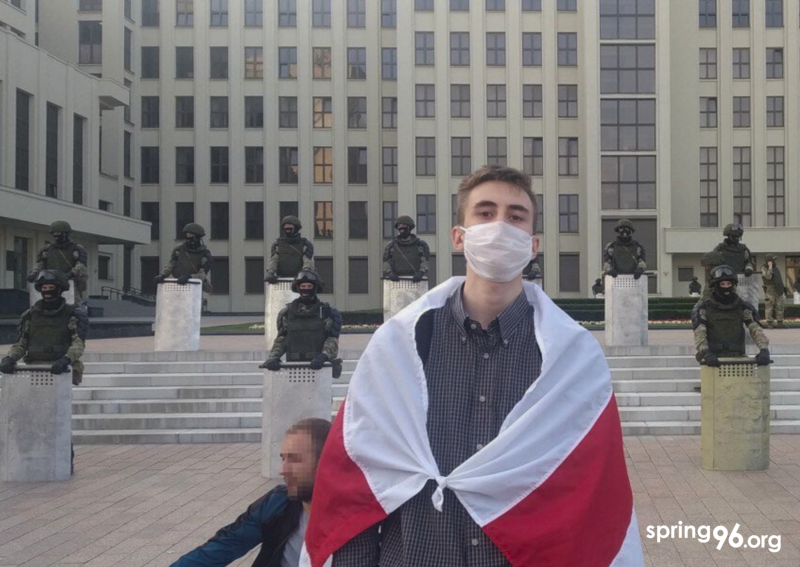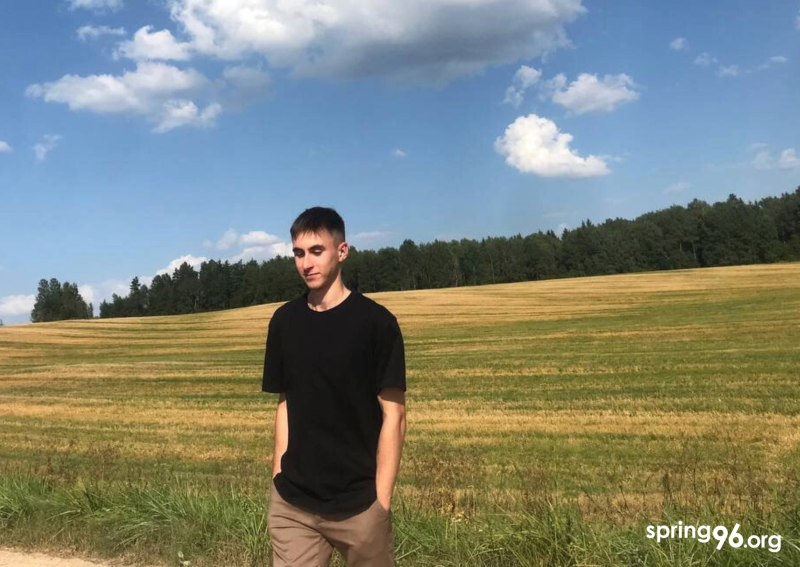"Shove your rights up your ass," a former political prisoner speaks about the pressure in home confinement
23-year-old Aliaksandr Svirydzenka has been detained three times since 2021; the last time as part of a criminal case under the Article 342 of the Criminal Code, for participating in protests in Minsk in 2020. He was sentenced to two and a half years of home confinement and released after the trial from the pre-trial detention center, where he spent three months. While the man was in custody, he was expelled from Belarusian State University (BSU). At the beginning of 2024, the man was forced to leave Belarus due to the risk of repeated persecution. Aliaksandr told Viasna about poor-quality medical care in detention, restrictions in home confinement, detentions for "rules violation", and conditions of detention in the temporary detention facility at Akrescina.

- Aliaksandr Svirydzenka
"I was a suspect for two years"
On April 7, 2023, Aliaksandr was summoned to the Investigative Committee to clarify the details of the criminal case that was initiated against him in the spring of 2021. Then he was released as a suspect under Article 293 (mass riots) for comments and Article 342 of the Criminal Code (active participation in actions grossly violating public order). In the end, only the Article 342 of the Criminal Code was left.
In the evening of the same day, he received a call and was told to come on April 10 to "familiarize himself with the procedural decision." The man immediately realized that he would be taken into custody. He found a lawyer the same day. Then Aliaksandr was taken directly from the Investigative Committee by GUBOPiK officers to the pre-trial detention center at Valadarskaha.
He was in the detention center for exactly three months. On July 11, judge Maksim Trusevich found the man guilty of participating in peaceful protests in 2020 and sentenced him two and a half years of home confinement. All this time, the former political prisoner was in Valadarka prison in cell No. 14. Many of Aliaksandr's cellmates were political prisoners, among them Viktar Zhavaranak, musician and photographer Hleb Hladkouski, Yauhen Toustsik, Anton Belich, Artsiom Sasnouski, Dzianis Pishchala, as well as Aliaksandr Ioda, convicted of donation and participation in protests.
Musician Hleb Hladkouski liked to watch music programs on TV in their cell, conducted English lessons for fellow inmates, and translated some famous songs from English into Russian.
According to the man, political prisoner Dzianis Pishchala had serious back problems. For a while he couldn't even move around in the pre-trial detention center, so he just had to lie in the cell. In the colony, according to information from his cellmates, he also did not receive medical care.
"Nothing could be worse than getting sick in a pre-trial detention centre"
The former political prisoner notes that it is difficult to get high-quality psychological help in prison.
"In the pre-trial detention center, I met a man who was imprisoned for not paying alimony. During a conversation with him, I found out that he has a duodenal ulcer. I suggested that he apply for a diet. But he was refused.
There was another prisoner, Aliaksandr, who had HIV. He looked about 70–80 years old, but in fact he was only 50–55. He had constant health problems, with blood pressure. He could just start shaking, he got sick and his face turned red. He often had a headache, problems urinating, and it was difficult to get help for him, although it was needed. But they just ignored him. And, to be honest, we thought that he would not make it to his release. Nothing could be worse than getting sick in a pre-trial detention centre. It's terrible."
There were also problems with medicines in the pre-trial detention center: the doctor could only offer ambroxol, chlorhexidine, loratadine, and paracetamol. So only the common first-aid kit, which the prisoners assembled themselves, saved them.
"I came the next day, and they said to me: 'That's it, you get a 15 days detention again'"
Aliaksandr was in home confinement from August 2023 until the beginning of 2024. The man had to leave Belarus because of repeated "violations of the rules of serving his sentence." He could face increased punishment and transfer to a colony for it.
"The first violation happened when I was supposed to be home at 19:00, but arrived at 19:20. They came to check me, saw that I was not there, and left. The inspector did not want to listen to any excuses; 15 days of detention.
The second violation was missing a lecture. I immediately called the inspectors who usually checked me. I came the next day, and they said to me: 'That's it, you get a 15 days detention again'."
In their free time, those sentenced to home confinement are prohibited from attending cultural events, gyms, shopping malls, and places where people drink alcoholic beverages. In addition, one can not travel outside the city.
"Shove your rights up your ass"

It is difficult for those convicted of home confinement, especially under a political article, to find a job. After registration in the police department, a person has several weeks to find a job, while employers, as soon as they learn about a criminal record and restrictions, often either refuse immediately or simply do not call back.
Aliaksandr started working in a cafe after his release. According to the man, because of his inspector's biased attitude, he had problems with his work schedule. The man had problems if he was released earlier from work or, conversely, was delayed, due to circumstances beyond his control: if the cafe closed earlier, or, for example, if there was a cleaning day.
"I came to her once, tried to explain myself. She was very aggressive. She said that she was tired of us and she would send me to work on industrial plantations. I told her that I have the right to work wherever I want. To which she replied, 'Shove your rights up your ass'."
Aliaksandr was checked once a week. Usually, according to him, they come to those sentenced to home confinement more often, but due to the inconvenient location of his apartment and security measures at the entrance, they came to him less often. Sometimes they came to check him at night.
"I was nervous because there were bedbugs and people with HIV there"
According to the former political prisoner, there were about six beds for 18 to 24 people in the temporary detention facility at Akrescina, of which only a part were political prisoners.
"There were bedbugs in the cell, and I had not met them before. One man was bitten by a bug, and he had an allergic reaction. He called the doctor and showed the bitten place. The doctor looked at the bite for half a second and said that he had nothing there.
On the very first day, one person had high blood pressure, and he was shaking. It was scary: he was sitting there, and his legs were shaking like he was a drummer. He turned pale, bruises appeared under his eyes, and he was about to lose consciousness. That's why we called the doctor. She said that he didn't have high blood pressure. But some of the non-political prisoners wanted to solve the issue, so they spoke to the guard and quarreled with the doctor for a long time. As a result, she gave him a pill.
And in one of the cells on the ground floor there was a horrible scene: there were bloodstains on the walls, on the ceiling. They were traces of dead bedbugs. And there were two people with HIV among us. So I was a little nervous about the fact that there were bedbugs and people with HIV there. They were regularly given medicines upon request. Only once did this pseudo doctor refused to give them."
"They put a tiny microphone on the table for recording"
While Aliaksandr was imprisoned, he and two other students detained for political reasons were expelled from BSU.
The former political prisoner tried to get back to the university after his release from jail, but he was never accepted back.
"After my sentence, at the end of July, I came to an appointment with Andrei Karol (rector of BSU). I enter his office, and there was Karol in the center, and on his left hand at a separate table the dean and three other employees of the dean's office, or rectorate. I sat down, and they put a tiny microphone on the table for recording. Karol asked what the purpose of my visit was, and I said, "resuming my studies."
Then I asked if there would be any bias towards me as a person with a criminal record. After all, the law does not prohibit those sentenced to home confinement from getting higher education. And even those who are in the colonies are not prohibited to do that. He replied that, of course not, 'Of course, Aliaksandr, let's move gradually and step by step; come in the fall and resume your studies.'
I came in the fall, but they refused me, referring to the fact that I was expelled in the second semester, which means that I need to start from it, that is, come after the winter exam period. I came after the winter exam period, they refused me again, because, allegedly, the program had changed and I did not have enough credits. I had to have 20 more in various subjects. At first I agreed. Then I came again and said I was ready to get them, but they refused me just for no reason. They said, 'It is impossible to get more than 10, so, goodbye, you can try it at Belarusian State Pedagogical University'."

















